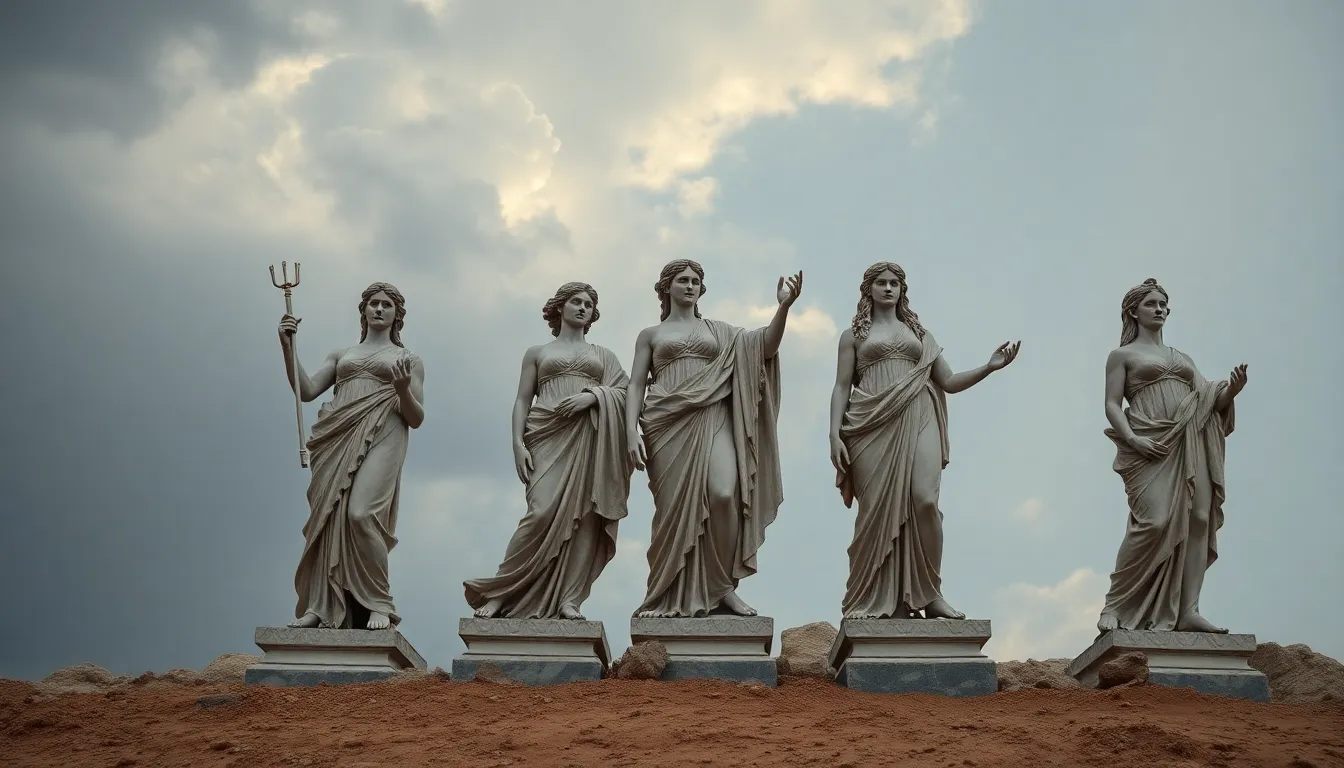The Fates: An Exploration of Their Influence on Greek Philosophy
I. Introduction
The Fates, known as the Moirai in Greek mythology, are personifications of destiny and the inevitability of fate. They are typically depicted as three sisters who control the thread of life for every individual, weaving the tapestry of existence with their threads of fate. The Fates hold a significant place in ancient Greek culture, symbolizing the inescapable nature of destiny and the balance of free will. This article aims to explore the profound influence of the Fates on Greek philosophy, shedding light on how their existence shaped philosophical thought throughout antiquity.
II. The Concept of Fate in Greek Mythology
The Fates consist of three distinct figures:
- Clotho: The Spinner, who spins the thread of life.
- Lachesis: The Allotter, who measures the thread, determining the length of life.
- Atropos: The Unturnable, who cuts the thread, signifying death.
Together, they represent the life cycle of human beings, from birth to death. Their roles symbolize the belief that life is predetermined and that each person has a fixed destiny that cannot be altered. This raises the question of the interplay between fate and free will, a theme that resonates deeply throughout Greek philosophical discourse.
III. The Fates and Pre-Socratic Philosophy
Early philosophers grappled with the concept of fate, offering various interpretations:
- Heraclitus: He proposed that change is the fundamental essence of the universe, suggesting that while fate exists, it is intertwined with the natural order of things.
- Pythagoras: He viewed fate as related to harmony and order, believing that understanding the cosmos could lead to a better grasp of one’s fate.
These early thinkers laid the groundwork for understanding fate as a crucial element in the fabric of reality, leading to deeper philosophical inquiries about the nature of existence and the human condition.
IV. Fate in the Works of Plato
In Plato’s dialogues, particularly “The Republic,” the Fates are invoked to discuss the nature of justice and the ideal forms. Plato’s exploration of fate versus ideal forms raises critical questions:
- How do the Fates fit within the realm of ideal forms?
- Can the pursuit of the good life alter one’s fate?
Plato posits that while fate plays a role in human existence, the pursuit of knowledge and virtue can lead to a more favorable outcome. His theories of ethics and morality reflect the tension between predetermined destiny and the individual’s capacity for choice.
V. Aristotle’s Perspective on Fate
Aristotle offers a different view on fate, connecting it to his theories of causality. In “Nicomachean Ethics,” he discusses the Fates in relation to moral responsibility:
- He emphasizes that while certain aspects of life may be determined by fate, individuals still possess the agency to make choices.
- Aristotle’s belief in the importance of character and virtue suggests a balance between fate and human agency.
This perspective encourages a nuanced understanding of fate, where it coexists with the ethical responsibilities of individuals, allowing for a dynamic interaction between destiny and free will.
VI. The Fates in Hellenistic Philosophy
During the Hellenistic period, philosophical schools such as Stoicism and Epicureanism presented contrasting views on fate:
- Stoicism: Stoics embraced the concept of fate, viewing it as a natural law that governs the universe. They taught that accepting fate leads to inner peace and tranquility.
- Epicureanism: In contrast, Epicureans challenged the deterministic view of fate, advocating for the role of chance and personal agency in shaping one’s life.
This debate significantly influenced later philosophical thought, as thinkers sought to reconcile the acceptance of fate with the assertion of individual freedom.
VII. The Fates and Their Legacy in Later Philosophical Traditions
The concept of fate transitioned into Roman philosophy, where it was often reinterpreted:
- Roman thinkers integrated Greek notions of fate with their own beliefs about the gods and the cosmos.
- In medieval philosophy, the Fates were often associated with divine providence, influencing theological discussions on predestination.
- Modern philosophy has revisited the Fates, particularly in existential and metaphysical discussions, exploring the tension between fate and free will in the context of human experience.
This legacy underscores the enduring relevance of the Fates in philosophical discourse, prompting ongoing reflection on the nature of existence.
VIII. Conclusion
In summary, the Fates have profoundly influenced Greek philosophy, shaping key discussions about destiny, morality, and human agency. Their portrayal as powerful figures controlling the threads of life raises critical questions about the balance between fate and free will, a theme that remains relevant in contemporary thought. The exploration of the Fates invites us to reflect on our own lives and the forces that shape our destinies, encouraging a deeper understanding of the human experience.
As we navigate the complexities of existence, the interplay between fate and free will continues to resonate, reminding us of the delicate balance we must maintain in our pursuit of meaning and purpose.




